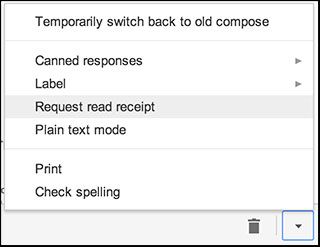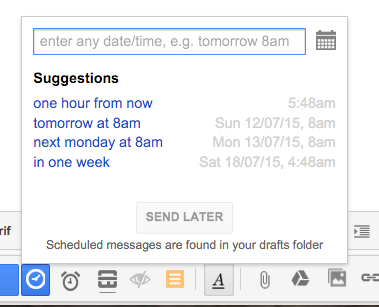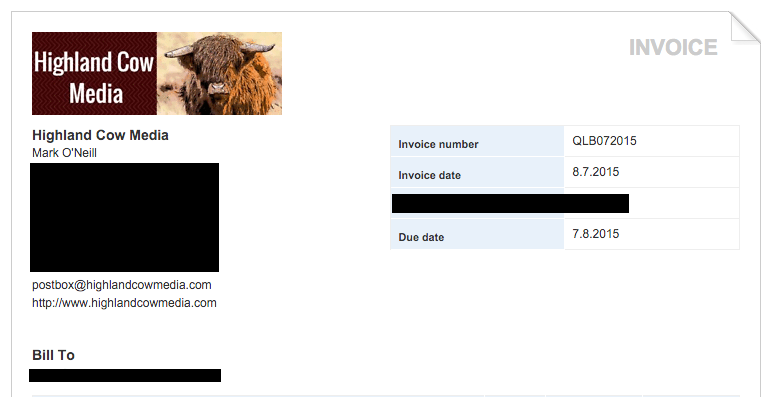The biggest drawback to working for yourself is the constant worry that eventually one of your clients is going to stiff you on the bill. You work for weeks or months on that "urgent project" which consumes your days, nights, weekends, holidays, and kid's birthday party. You triumphantly finish 24 hours ahead of schedule, send in your invoice, then... nothing.
I have had the misfortune of non-paying clients before, and it wasn't for inconsiderable amounts either. So I went through the following options to get my money back. In the end, I succeeded every time.
The "Going Through The Motions" Options
Send an Email With Attached PDF Invoice (& Establish Proof They Received It)
First off, you need to establish a firm paper trail, showing you made a good-faith effort to communicate with the deadbeat chancer. Set up a sequence of three emails, with a copy of the PDF invoice attached. One invoice should say "First Reminder", second one "Second Reminder", and the third one "Final Reminder". Each invoice should indicate that payment is due "on receipt" (i.e. immediately).
Keep the emails polite and cheerful. Simply state that the payment hasn't been received yet, and could they check their payroll records to find out the status of your invoice. As well as checking their bank account to see if the payment has been returned.
In other words, don't jump to conclusions. It could well end up just being a bank snafu, and if you falsely accuse them of welching on their debts, you will be minus one customer by the end.
You can verify that they have received the emails by various methods. If you are a Google Apps for Work customer, then there is a read receipt function (although in some cases, the person at the other end has to agree for it to be sent). Third party apps are a surer bet.
By far, the best option is Streak. You will get read receipts without the other person even realizing that you are receiving them. You can also schedule emails to go out at set times, so you can set up those further reminders, and they will be automated to go out themselves (Boomerang also offers this service).
Another option is a hack, suggested by Amit Agarwal of Digital Inspiration. It involves the use of the Google link shortening service, Goo.gl.
Paypal & Other Online Payment Services
If you use Paypal, or another similar service, then you can send out invoices from those accounts to encourage late payers to pay with their credit card (or account balance, if they also use those online payment services). Paypal Seller Protection would not be applicable for chasing unpaid invoices as it is only for protecting a seller from false credit card chargebacks.
But Paypal and other services provide another option for people to pay. Just say in your reminder emails, "if you would like to pay by credit card through Paypal, let me know, and I will send you an invoice". And when you send the invoice out, there is also a reminder function, which sends the invoice again.
The "Turning The Screws" Options
If the invoices are still not being paid, then it's time to turn the heat up a bit. Since this article is about using the Internet to pursue unpaid invoices, then I will just briefly mention two other essential steps before you break out the knuckledusters (that was a joke by the way - for the record, I never advocate violence under any circumstances).
First, phone the person and nicely ask about the invoice. If that doesn't work, an in-person visit has often proved effective for me. It gives me the opportunity to scowl at the person and watch them squirm.
OK, now that we have the niceties out of the way, let's move onto the "getting medieval" methods.
Start Adding Interest
OK, this is not an "Internet" one, but nevertheless, it's the first step in turning up the heat. After the last reminder, for every 30 further days that the money is late, I add 10%. And to really annoy them, I add the cost of the stamp. You'd be amazed how many people cough up when you start adding interest.
Stop Doing Any Remaining Work (& Consider Dismantling What You've Done)
When you are doing a huge project, it makes sense to split it up into 3 or 4 stages, and ask for a third or a quarter of the payment, per stage. That way, if they intend to screw you out of any money, you wouldn't lose it all.
So when the payments stop coming, then immediately stop the project. If the person complains, tell them you have a gas bill needing paid, and the gas company doesn't accept imaginary money. And if it becomes abundantly clear that the money is never coming, or they attempt to renegotiate your price, then dismantle what you have already done. So if you made a website for them, take it offline. If you are building a house, blow it up with dynamite. You get the idea.
Twitter is great for making innocuous remarks about people, that keep you just about on the right side of libel law.
If an individual or company has diddled you out of money and committed a breach of contract, then you would be well within your rights to vent about it. And where better than Twitter right? Anyone searching Twitter for that person's / company's name will see your comments (hopefully the company too).
Just don't go too far and start publishing home addresses, phone numbers, photos of the family, etc. That's where you will have crossed the line, and you will have more than an unpaid invoice to worry about.
Your Company Blog
The downside about Twitter is that tweets are not indexed by the search engines. So anyone Googling for the name of the person or company who scammed you, will not see your thoughtful 140 character essay, written all in caps.
This is where a "naming and shaming" blog on your company site would be good, because Google will jump all over that like the Ebola virus. It will help a lot to keep the name of the person or company at the top of the Google search results, and seriously annoy them as a result. It will also affect their bottom line when prospective clients check up on them and see that they failed to pay their debts. They may then pay their bills, in return for the blog post being taken down.
I had such a blog on a now-defunct website, and the effects it had on deadbeat payers was fantastic.
But again, just stick to the facts, and don't make any libellous statements about them. As long as you calmly stick to the facts, all you're doing is exercising your constitutionally-protected right to free speech.
Legal Routes
If all THAT doesn't work, then you may have to consider writing the debt off. But if the amount is for a fair amount of money (say $1,000+), then consider going to small claims court to pursue the matter. This is where I can't advise you though, as legal options vary from country to country. But if you do the paperwork, and represent yourself, you wouldn't have to pay for a lawyer to do it. Just judge whether or not the unpaid amount justifies the amount of time, effort, and hassle that a small claims action is going to involve.
If you decide that the legal route is not worth it, then there is always the voodoo doll option.
What methods have you used in the past to claim unpaid invoices? Which Internet-based methods do you like the best?
Image Credits - running with butterfly net via Shutterstock, Overworked & Exhausted - Shutterstock, Medieval Torture Chamber - Shutterstock, Chipmunk With Detonator - Shutterstock, Grumpy Old Judge - Shutterstock












